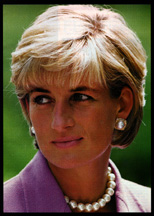
My kind Web Host requests that I ask you to think about Princess Di and not buy tabloid newspapers. I humbly do so here.
But as a journalist, I see the issue as much more complex than that.
I was very moved and disturbed by the death of Princess Di, but while I acknowledge the photographers' involvement in her death -- and a tragic role it was -- I can't say the paparazzi were the reason for her death. The issue goes so much deeper than that.
We could discuss the horrid treatment of celebrities hounded wherever they go on their own private time. We could discuss the law regarding journalism in different countries. We could talk about the role of the celebrities in our culture, or about royalty in modern society. We could even discuss drunken driving (though I think that would be a short discussion, as few people advocate it). Or if you like, I could tell you how I stayed up all night and cried watching Lady Di's funeral procession on televison.
Despite having a "fairy tale" existence, Diana Spencer lived a sad life under a microscope -- partly of her choosing, partly of her unchosen fate. Journalists set standards of coverage based upon societal roles -- roles of birth, roles performers and leaders choose for themselves and the roles fate places upon people. And our society thrives on the sensations created by people such as Lady Di. She was the princess we all wished we could be, or wished we could woo.
Celebrities thrive on publicity, and they seek to control it. Yet in a free society, the media are not controllable beyond libel laws that make it nearly impossible for a public personality to prove malice aforethought.
 The British Press Complaints Commission has asked newspaper editors
to voluntarily adopt regulations against paparazzi pictures, chasing, stalking
and hounding. The new code would require editors to justify the actions
of anyone working for them -- staffers and free-lancers alike. That is a
postive step in a time when newspapers are seen as arrogant and unresponsive.
The British Press Complaints Commission has asked newspaper editors
to voluntarily adopt regulations against paparazzi pictures, chasing, stalking
and hounding. The new code would require editors to justify the actions
of anyone working for them -- staffers and free-lancers alike. That is a
postive step in a time when newspapers are seen as arrogant and unresponsive.
What the paparazzi did to Princess Di was undoubtedly wrong. Driven by greed no less than that of a cocaine distributor, they robbed her of privacy and escalated an already risky situation with an impaired driver behind the wheel.
Tabloids wouldn't pay photographers to be hounds if that kind of trash didn't sell. What bothers me about blanket "don't buy tabloids" imperatives is they ignore the fact that all television and most newspapers participate to an extent in such voyeurism. Very reputable newspapers run stories and photos that are intrusive to some extent. And we, the public, lap it up. The question is to what extent we invade people's privacy, and to what extent they invite the media into their lives.
As technology closes in around us in an age of information overload, how do we draw those boundaries? Those "tabloid" newspapers come to us in our e-mail, in syndicated columns, on CNN, via local news and through the rumors we hear on the street.
Gossip sells. And when it goes too far, gossip kills.
Nic's Abode | See what David Duchovny said about paparazzi